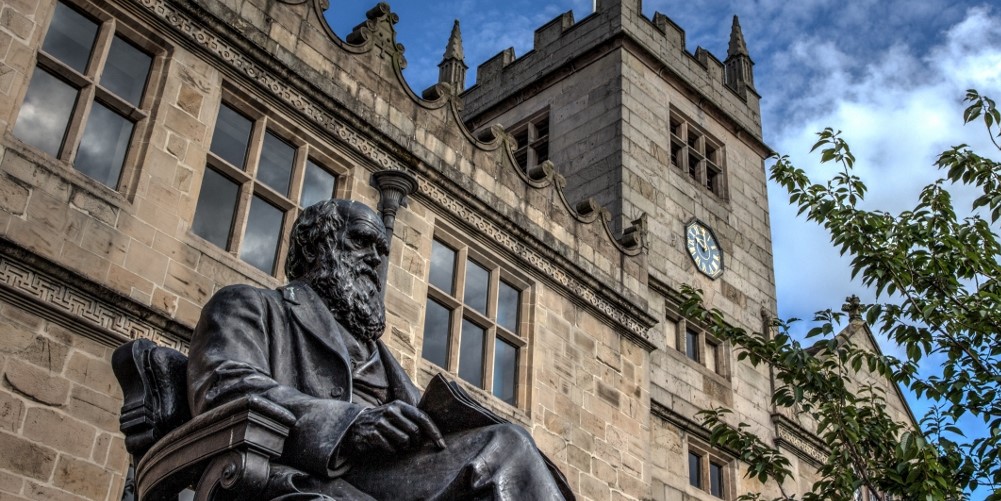Remarkably, modern progressives have found a way to be moral relativists and intolerant absolutists at the same time.
Man, Descending
The year 2021 marks the 150th anniversary of the publication of Charles Darwin’s The Descent of Man. While 1859’s On the Origin of Species is generally regarded as his most important work, it is in the Descent that we find Darwin’s most radical ideas concerning natural selection’s implications for human nature and the moral and political dimensions of human life.
The Descent ranks as one of the most subversive texts in human history. Darwin brands the view that man’s origin can never be known—that is, that it might lie beyond the reach of the human intellect to explain—as the product of ignorance, and he sets about showing that it is a problem that can be solved by science.
To say that man’s origin is explicable in scientific terms is truly a radical claim. Whatever it is that makes human beings distinct—our apposable thumbs, upright posture, and complex speech mechanism, as well as our literature, philosophy, and sacred texts—can be explained by the very same forces that shaped blue-green algae.
Human beings, in other words, are solely and entirely the products of natural forces. With a few strokes of a pen, Darwin lays the groundwork for the disenchantment of human nature and human affairs. For example, he opens chapter two of the first volume by declaring his intention to show that “there is no fundamental difference between man and the higher mammals in mental faculties.”
In sharp contrast to the Cartesian account of non-human animals as automata, Darwin declares it indubitable that non-human animals “feel pleasure and pain, happiness and misery.” Animals dream, dogs love their masters, and even insects play together. He even goes so far as to assert that “All animals feel wonder, and many exhibit curiosity.”
The subversive impact of these assertions lies not in the notion that many supposedly exclusively human traits are far from unique, but rather that these traits are not so remarkable as we suppose because they are the product of forces that natural science can describe and explain. To repeat, we are what we are, Darwin asserts, entirely by virtue of natural forces.
One of the longest-running debates in western thought concerns the relationship between the lower and higher. The Book of Genesis, Plato, and Augustine all posit that the lower can only be explained in terms of the higher. Darwin, by contrast, locates himself in the camp of thinkers such as Marx and Freud in arguing that the higher can and must be accounted for in terms of the lower.
In the Bible, for example, creation is often understood as a story of divine love. The world rests not so much on a foundation of matter in motion or laws governing the behavior of molecules, atoms, and subatomic particles, but on stories of how love brings the world into being and helps it to reach its full fruition. Action and reaction are less fundamental than adoration.
In Darwin, by contrast, the key ingredients for the world as we know it are scarcity, competition, and the struggle to survive and reproduce. The weak and infirm are continually culled out, as the forces of nature select for the best adapted among organisms. In Tennyson’s formulation, we are the perfectly natural byproducts of a pitiless nature “red in tooth and claw.”
What basis does Darwin provide for regarding sympathy as the “noblest part of our nature”?
It is only natural then that Darwin, who subverts the traditional order and puts the lower atop the higher, presents students of anthropology with a radically new and different problem. It is not the traditional problem of theodicy—why in a world created by a loving God bad things happen to good people—but how traits such as compassion come to exist at all.
If the natural world is built on merciless competition to survive and reproduce, how is it possible that a species has arisen—human beings—who devote a great deal of time, effort, and money preserving the lives of those who, according to the dictates of natural selection, should be quickly and efficiently snatched from existence?
Writes Darwin:
With savages, the weak in body or mind are soon eliminated; and those that survive commonly exhibit a vigorous state of health. We civilised men, on the other hand, do our utmost to check the process of elimination; we build asylums for the imbecile, the maimed, and the sick; we institute poor-laws; and our medical men exert their utmost skill to save the life of every one to the last moment. There is reason to believe that vaccination has preserved thousands, who from a weak constitution would formerly have succumbed to small-pox. Thus the weak members of civilised societies propagate their kind. No one who has attended to the breeding of domestic animals will doubt that this must be highly injurious to the race of man. It is surprising how soon a want of care, or care wrongly directed, leads to the degeneration of a domestic race; but excepting in the case of man himself, hardly any one is so ignorant as to allow his worst animals to breed.
Such a view of the natural order has become so deeply ingrained in our culture that it is only with considerable effort that we can recognize how strangely subversive it truly is. The weak should be eliminated. That they are not, and that they even survive to propagate their kind, is subversion indeed, for allowing the “worst animals to breed” can lead only to the “degeneration of the race.”
Darwin paints us into a corner. If human beings truly are just as much a product and part of the natural world as any other species, and therefore a manifestation of the very same forces of natural selection, then those who express such sympathetic tendencies should have been selected against and extinguished eons ago by colder and more calculating competitors.
Darwin seeks to explain this apparent contradiction in terms of sympathy:
The aid which we feel impelled to give to the helpless is mainly an incidental result of the instinct of sympathy, which was originally acquired as part of the social instincts, but subsequently rendered, in the manner previously indicated, more tender and more widely diffused. Nor could we check our sympathy, even at the urging of hard reason, without deterioration in the noblest part of our nature. The surgeon may harden himself whilst performing an operation, for he knows that he is acting for the good of his patient; but if we were intentionally to neglect the weak and helpless, it could only be for a contingent benefit, with an overwhelming present evil. We must therefore bear the undoubtedly bad effects of the weak surviving and propagating their kind; but there appears to be at least one check in steady action, namely that the weaker and inferior members of society do not marry so freely as the sound; and this check might be indefinitely increased by the weak in body or mind refraining from marriage, though this is more to be hoped for than expected.
Darwin attempts to seduce his readers by sleight of hand. First, he makes sympathy an “instinct.” Since it, too, must have arisen from the same natural forces that explain everything else about us, sympathy must be instinctive. Because human beings felt sympathy toward one another, they were able to cooperate and out-compete solitary human beings.
Yet what basis does Darwin provide for regarding sympathy as the “noblest part of our nature”? If he is correct, for the time being sympathetic groups might outcompete individuals who look out only for number one, but over time, should we not expect groups to arise that maintain cooperation yet cast off their weak, thereby reaping an even greater survival advantage?
Think of ancient Sparta, which practiced infanticide, or the more recent specter of Nazi Germany, which sought to eliminate “worthless eaters” while preserving a strong spirit of patriotic unity. In Darwin’s purely naturalistic portrait of creation, allusions to the “noblest part” of human nature ultimately ring hollow.
In Darwin’s scheme, there can be no noble or ignoble, no virtuous or vicious, and ultimately no high and low—there is only impersonal natural selection, patiently winnowing the biological chaff from the kernel, and translating tiny differences in adaptation into the death of organisms and species. There is no good or evil, but only what persists and what does not.
The most urgent question is not whether Darwin had it right but whether his account eliminates all possibility of right (and wrong). If survival is life’s be-all and end-all, then we are living in an anti-natural way and precipitating our own demise. Goodness and mercy cannot stand. On the other hand, if right somehow precedes or supersedes natural selection, then a spirit such as love might remain our guide.



